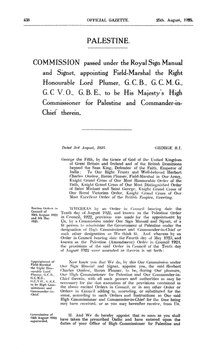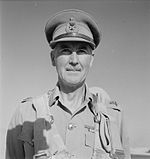
Back المفوضية السامية لفلسطين وشرق الأردن Arabic Alto Comisionado para Palestina y Transjordania Spanish کمیسر عالی فلسطین و ماوراء اردن Persian הנציב העליון HE Komisioner Tinggi untuk Palestina dan Trans-Yordan ID Alto Commissario per la Palestina e la Transgiordania Italian Wysoki komisarz Palestyny Polish Верховные комиссары Палестины Russian 巴勒斯坦託管地高級專員 Chinese
| High Commissioner of Palestine and Trans-Jordan | |
|---|---|
 Badge of the high commissioner of Palestine | |
 Flag of the high commissioner of Palestine | |
Alan Cunningham, the last high commissioner for Palestine and Transjordan | |
| Style | His Excellency The Right Honourable |
| Residence | Jerusalem |
| Appointer | Monarch of the United Kingdom |
| Formation | 1 July 1920 |
| First holder | Sir Herbert Louis Samuel |
| Final holder | Sir Alan Cunningham |
| Abolished | 14 May 1948 |
The high commissioner for Palestine was the highest ranking authority representing the United Kingdom in the mandated territories of Palestine, and the high commissioner for Transjordan was the highest ranking authority representing the United Kingdom in Transjordan. These posts were always held simultaneously by a single individual after the high commissioner for Transjordan was established in 1928.
The British representative to Amman was "responsible to the high commissioner in his role as representative of the mandatory power, but not in his capacity as head of the Palestine administration."[1]
They were based in Jerusalem. The office commenced on 1 July 1920, before the commencement of the Mandate on 29 September 1923, and replaced the British military occupation under the Occupied Enemy Territory Administration, which had operated in Palestine in 1917–1918. The office ceased with the expiration of the Mandate on 15 May 1948.
When the office of high commissioner was vacant, or the high commissioner was unable to perform his duties for some reason, a person who was usually the chief secretary of the government of Palestine was appointed to perform the same duties with the same powers.[2]


- ^ Mary Christina Wilson (28 June 1990). King Abdullah, Britain and the Making of Jordan. Cambridge University Press. pp. 73–. ISBN 978-0-521-39987-6.
For example, his desire that Transjordan be totally dissociated from Palestine was accomplished by the fine distinction of making Philby responsible to the high commissioner in his role as representative of the mandatory power, but not in his capacity as head of the Palestine administration. (Privately, London held the reservation that 'the door would not be closed to a possible rapprochement between the two administrations in the future.)
- ^ The Palestine Order in Council, 1922, Clause 7.
